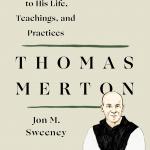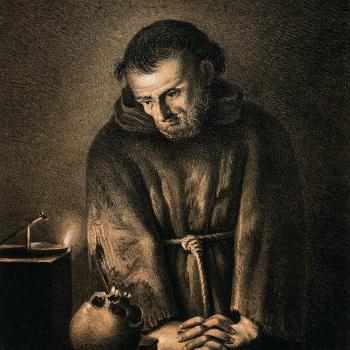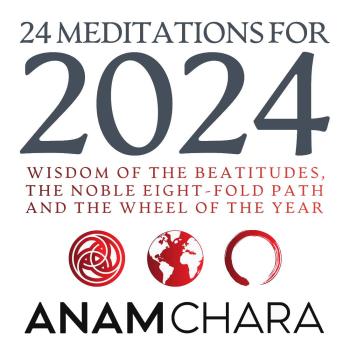I first “met” Julian of Norwich through reading Evelyn Underhill’s magisterial book Mysticism: The Nature and Development of Spiritual Consciousness.
Underhill’s book changed my life, for a number of reasons: it gave me a language and a context for making sense of my spiritual experience, it helped me to see that there is a place for an intellectually honest, interfaith-friendly expression of Christian spirituality, and — perhaps most important of all — Underhill introduced me to the grand tradition of Christian mystical and contemplative spirituality, which means that through her book I was introduced to St. John of the Cross, St. Teresa of Ávila, The Cloud of Unknowing, Meister Eckhart, St. Catherine of Genoa, among many others… including the “Lady Julian,” as Underhill described her.
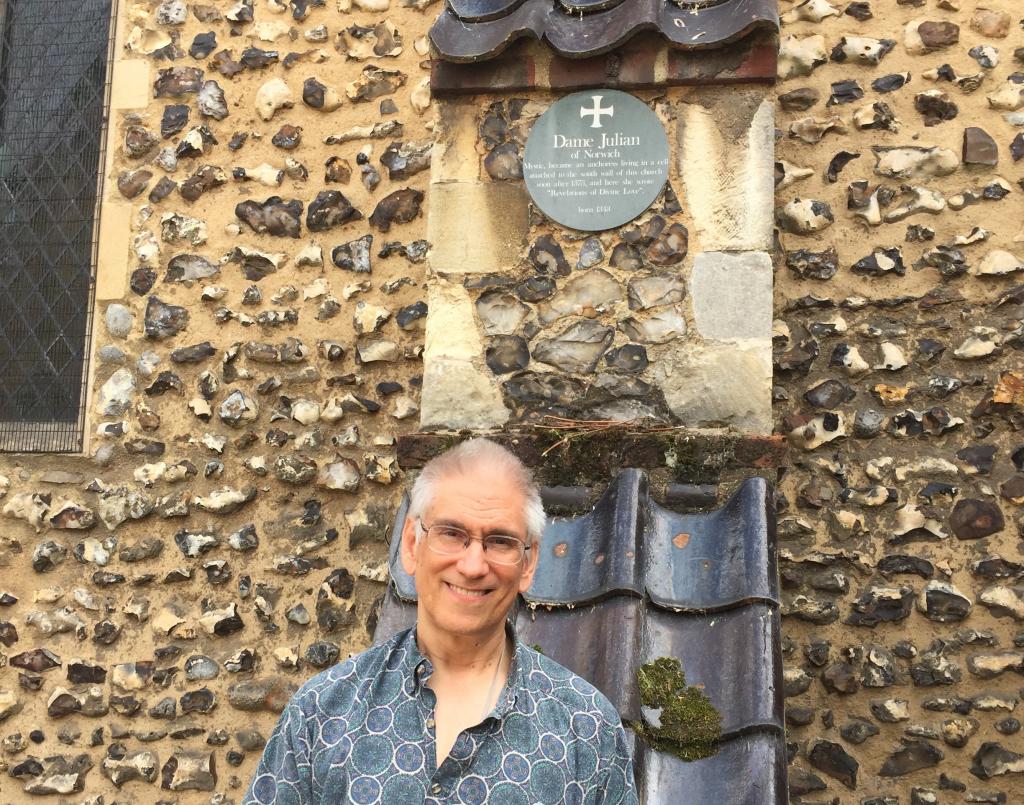
A Kindle search reveals that Julian is mentioned almost forty times in Underhill’s book — not as frequently as St. Teresa of Ávila (over 200 times) or even Meister Eckhart (nearly 90), but often enough for me to notice. Underhill described Julian as “a seer, a lover, and a poet” … “whose unique personality closes and crowns the history of English mediæval mysticism.” Julian’s book, The Revelations of Divine Love, Underhill declared to be “the most beautiful of all English mystical works.”
When Paulist Press published a modern-English edition of Julian’s writings in 1978 (the first volume of their legendary “Classics of Western Spirituality” series), I purchased a copy — only to find that her allusive, deeply poetic style of writing was challenging for me to read. I did not realize this when I was in my early 20s, but Julian, like all the mystics, wrote from a place of visionary union with God, which means that she (like all the mystics) is best approached from a place of prayer, meditation and reflection.
Like the Bible, Julian most readily yields her secrets when a reader brings a spirit of lectio divina to her text: which is to say, a way of reading and reflecting on her mystical words that is grounded in prayer.
In May 1984 I attended a Quiet Day (a one-day retreat) sponsored by the Shalem Institute in Washington DC; the theme was Julian of Norwich. This was my first communal contemplative experience; needless to say, it made a profound impact on me as I discovered I was not alone in my heartfelt yearning for a deeply silent encounter with God.
But at that Quiet Day I also learned that a group of Episcopalians had formed a new religious community called the Order of Julian of Norwich; not sure if I had it in me to become a monk, I nevertheless felt compelled to write to the community’s superior, Fr. John-Julian, and he and I exchanged a couple of letters. In one of them I complained about how my own spiritual journey had led me to a place of confusion and anger, thanks to the spiritual abuse I encountered from a charismatic community I encountered while still in high school. I complained that I could no longer make sense of a religious world-view that was centered on reward and punishment, heaven and hell, judgment and damnation.
Fr. John-Julian replied and said that I needed to read Julian more seriously. I’ve long since lost the letter he wrote to me so I can’t quote him verbatim, but the gist of what he wrote was that if I wanted to get healed from the scars of an abusive theology, Julian’s hope and optimism was the best possible therapy for me.
Enjoy reading this blog?
Click here to become a patron.
In his book How to Change Your Mind, Michael Pollan quotes Rick Doblin as saying “Mysticism is the antidote to fundamentalism.” Doblin is speaking about the mysticism of psychedelic drugs, but thanks to Julian I can attest that the old-fashioned mysticism works just as well. Some thirty-five years have passed since I received that letter from Fr. John-Julian, and I am still learning how to plumb the depths of Julian’s richly nuanced poetry of heaven. But if my unhappy experience with charismatic Christianity introduced me to a god who judges, a god of anger and division who is barely talked out of destroying us all by the Christ who has to die to make his point — then Julian, by contrast, introduced me to the God who loves, the God of compassion and celebration who eagerly and joyfully goes to unending lengths to demonstrate how much delight God finds in each and every human soul, no matter how lost, corrupt or reprobate we might be.
When I first had an unexpected, mind-expanding, embodied encounter with God (a story I most recently told in chapter two of Unteachable Lessons), my overall sense of this God (who I now believe resides in every human heart) is that God is unconditional, lavish, Love-with-a-capital-L. Much of my distress in dealing with the charismatics and other variations of Christian fundamentalists arose from a simple sense of cognitive dissonance: while they paid lip service to “God is love,” their attitudes and perspectives all seemed to point to a god who demands submissive obedience — or else.
If the charismatic/fundamentalist god is a god of love, it is truly a conditional, probationary love: a love that is not easily earned but can all too easily be lost. This is what fundamentalism promised me, and what I could not accept because of what I knew in my bones to be true.
Julian validated what I knew in my bones. She invited me into her intimate relationship with a God who dances with joy, a God of delight and desire, a God who cherishes God’s own creation and seeks any way possible to heal and redeem all those who suffer therein. Julian is best known for optimism (“All shall be well”) and her anticipatory feminism (“As truly as God is our father, so is God our mother”). But her book is not called the “Revelations of Divine Optimism” or the “Revelations of the Divine Feminine.” Love is the heart of her theology, her image of God, and her experience of God. Everything we say or thing or visualize about God must be understood only in the context of lavish, vast, unconditional love. If this sounds “too good to be true” — it is that good, and it is true.
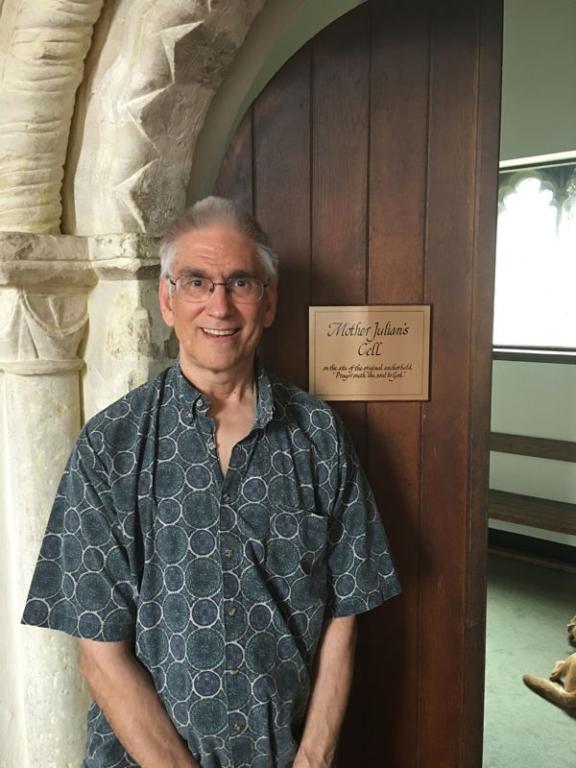
Of course, I’ve learned that the Bible, and the writings of so many of the great saints and mystics throughout Christian history, are gloriously messy and inconsistent: they often serve up images of God-the-Judge and the God-who-is-unconditional-Love in rapid succession. I once heard a talk by Brian McLaren where he proclaimed, in regard to Biblical interpretation, that “the things we focus on determine what we miss.” In other words, we cannot simply read the Bible at face value, we must interpret it, and if not consciously then we will do so unconsciously, catering to our hidden, unspoken assumptions about life and reality.
For far too long, mainstream Christianity — from Augustine to Calvin to John Piper — has focused on God’s judgment and tried to explain away God’s love as a kind of benefit that the elect only have access to. But I don’t think that vision of God squares with what Jesus had to say, and it doesn’t line up with Julian’s theology or my own experience. When we focus on God’s limitless, unconditional love, then we can see all the “judgment talk” in the Bible and elsewhere as efforts to make sense of a world where bad things happen, not as a threat to the ordinary person seeking to find their own way.
Julian offers us a way to find that radical, Love-with-a-capital-L understanding of theology, of grace, of what it means to follow Christ. When we see the Gospel through her eyes, it comes alive as a source of unending joy. That’s certainly been my experience, and I know I am not alone. Thanks to Julian, the heart of my spirituality is joy — which only makes sense, for Julian, after all, said “the fullness of joy is to behold God in all.”
Photos of the author at the Julian Shrine, St. Julian’s Church, Norwich, England by Fran McColman. Used by Permission.
Enjoy reading this blog?
Click here to become a patron.




